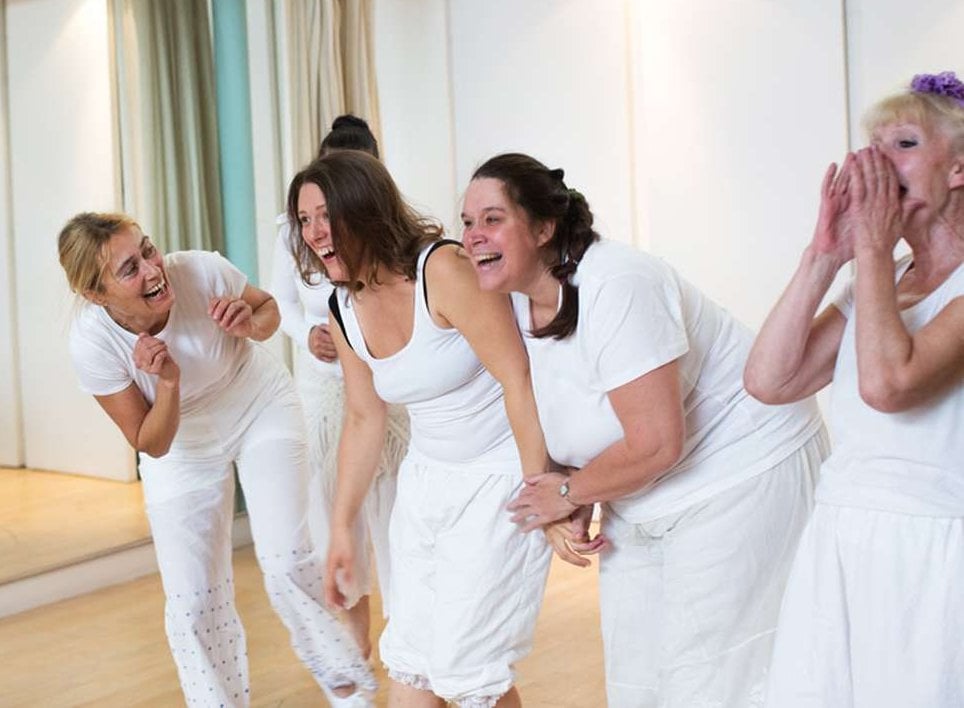
Women participate in a workshop run by Clean Break
Photo: Tracey Anderson
How to… run arts projects in prisons
Working in prisons is some of the most challenging but rewarding work Dan Boyden does. He offers advice for artists and arts practitioners on getting started.
Many arts organisations, including Clean Break, the Koestler Trust, Geese Theatre Company, and Safe Ground (that I’ve worked with), have shown how the arts can help individuals in the criminal justice system build new positive identities, leading to new skills and employment opportunities. This contributes to the end-goal of desistance – the term used for the process of personal growth through which offenders become non-offenders.
This is starting to be recognised more widely. Here is an extract from the AHRC Understanding of Arts and Culture final report of 2016: “At the heart of desistance is an ability to think about oneself and others, to see genuine choices and options, to imagine other life circumstances and other possible futures. Arts engagement makes a serious contribution to this process.”
Starting out
Running arts projects in prisons is consistently some of the most rewarding and powerful work I do. I’ve worked with groups of men who see themselves again as fathers, sons and brothers, as well as prisoners. They’re able to own their failures and share with each other what they’re finding hard.
Running arts projects in prisons is consistently some of the most rewarding and powerful work I do
It’s transformative for them and for me, but it’s not easy, and starting out in the sector can be daunting. The criminal justice system as a whole, whether in a prison setting or out in the community, can be a complex, hostile beast at times. While for prisoners it’s hard to get out, for artists it’s often hard to get in – and then once you’re in, navigating your way through the literal and metaphorical locked doors can be difficult.
So here are some tips for artists and arts practitioners on how to start out.
Build relationships
Build relationships with prison, probation or Youth Offending Team (YOT) staff, so that they understand as far as possible the way you work and your objectives. It’s also important to acknowledge and work with some of the assumptions around the arts, which look at prisoners and the prison system through a less punitive lens. The building of allies who take this view is usually a prerequisite for a successful arts project.
Navigate the system
Staff in prisons are often required not just to be prison officers but counsellors, mental health support workers and teachers. The system is overstretched. Add to that disorganised or outdated processes, and the result can be staff who seem unmotivated, highly stressed and uncommunicative.
Start somewhere, wherever that may be. You’ll need to manage your expectations about the scale and ambition of the projects you want to run, but start somewhere and see where that might take you. Identify what’s important to you personally and professionally and be guided by that, whether that’s a particular group, a theme or an issue. Identify organisations near you that you’d like to work with and put the time into building those relationships.
Work within the guidelines
Be prepared to work within guidelines established by the institution regarding the length of the sessions, number of participants, spaces available and prevailing norms. There are some non-negotiables, such as the length of the prison day, the way that prisoners are moved around the jail and the availability of support staff. Find out as much as you can about what these are and how they might have an impact on your programme.
Design and deliver collaboratively
If at all possible, the objectives, strategy and staffing of the arts project should be devised collaboratively with prison or education staff. If this isn’t possible, then the more information you can send in, the better. The focus of the work is with the prisoners, but see if there are opportunities for staff to get involved in the design and the delivery itself.
Plan well ahead
Prison, and sometimes probation regimes, will usually ask for a breakdown of equipment a long way in advance – weeks and possibly months. Allow a long lead-in time to have meetings, build relationships with staff and get security clearance for yourself and any materials.
Sources of support
The sector recognises that it needs more practitioners with their own lived experience of the criminal justice system, but often the transition to paid employment and the opportunities needed to manage this transition have been hard to find. However, there are schemes out there that help emerging artists with experience of the criminal justice system to get into the sector.
Since 2007, The Koestler Trust has supported ex-offenders to continue their artistic engagement by matching them with a specially trained arts mentor. The National Criminal Justice Arts Alliance (NCJAA) also runs a professional mentoring scheme that connects less experienced members looking for professional guidance, networking and advice with experts in the field.
The NCJAA is setting up a bursary scheme early next year that will be open to all members to support their training, organisational development or develop their specialist criminal justice expertise.
The Rideout Theatre Company is also setting up a new scheme ‘The Chris Johnson Memorial Fund’ in honour of its co-director. The scheme is for people interested in developing work around social justice and is run in association with Rose Bruford College.
Dan Boyden is Director of The Change Collective and is on the steering group of the National Criminal Justice Arts Alliance (NCJAA).
www.thechangecollective.com
www.artsincriminaljustice.org.uk
Join the Discussion
You must be logged in to post a comment.